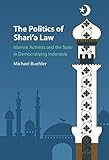Indonesia: Religion and Identity in the 2019 General Elections
Ahok
On 2 December, tens of thousands gathered in Jakarta to mark the 2016 rallies that led to the electoral defeat of the capital’s first ethnic Chinese and second Christian governor, Basuki “Ahok” Tjahaja Purnama.
At this recent rally, rhetoric by candidates for the 2019 presidential race clearly showed a strong anti-Christian bias.
In a speech pre-recorded from his base in Saudi Arabia, leader of the Islamic Defenders Front (FPI), Rizieq Shihab, called on his supporters to oppose all who are against Islam, saying that “During the 2019 elections, it is haram [forbidden] for us to vote for presidential and legislative candidates backed by parties supporting the blasphemer [i.e. Ahok].
“Let’s vote for presidential and vice presidential candidates based on the decision of Ijtima Ulama [i.e. a gathering of Islamic scholars that had been convened to select candidates].”
Rizieq’s political outreach is clearly focused on the many Muslim demonstrators who in 2016 took offence at a video that had been edited to make it sound as though Ahok had disparaged the Koran.
This led to massive rallies against him and his conviction for blasphemy, which was roundly condemned worldwide as being politically motivated.
Identity politics, increasing intolerance, and the economy are expected to feature heavily in Indonesia’s general elections, set for 17 April 2019. In November, Grace Natalie, a Christian and chair of the Indonesian Solidarity Party (PSI), said that if elected into parliament, “The PSI will prevent the emergence of injustice, discrimination and all intolerant acts in this country. The PSI will never support gospel-based bylaws or sharia-based bylaws.”
She clarified later that PSI’s stance was that religion should not be used as a political tool and that laws should be universal and fair rather than based on any religion.
Natalie’s comments reignited arguments regarding the sharia-inspired bylaws that have been enacted across the country. Secretary-general of the Indonesian Muslim Workers’ Brotherhood (PPMI), Zulkhair, filed a police report claiming that Natalie’s comments on sharia law went against the Koran.
Sharia bylaws are highly popular among Indonesian Muslims. In the Indonesia National Survey Project, which had a sample of 1,620 respondents from the country’s 34 provinces, 90.9% of Muslim respondents agreed that implementing sharia law would yield benefits, in particular that of protecting the moral values of society.
 Looking from the perspective of politicians, however, University of London’s Michael Buehler argues in The Politics of Shari’a Law (2016) that their support for sharia-based bylaws is based more on political rather than ideological or religious considerations. According to Buehler, “State elites in Indonesia are opportunist Islamizers whose affection for Islamic law is less emotional than transactional.”
Looking from the perspective of politicians, however, University of London’s Michael Buehler argues in The Politics of Shari’a Law (2016) that their support for sharia-based bylaws is based more on political rather than ideological or religious considerations. According to Buehler, “State elites in Indonesia are opportunist Islamizers whose affection for Islamic law is less emotional than transactional.”
In the same vein, a 2015 survey by the Syarif Hidayatullah State Islamic University’s Center for the Study of Islam and Society (PPIM) found that political interests were mainly behind sharia-based bylaws, with most actually passed during local election campaign periods.
Indonesia is the world’s most populous Muslim-majority country founded on Pancasila, five philosophical principles that uphold pluralism.
Yet this reputation for pluralism has been eroded by increasing attacks on minorities, leading to the 2018 United States Commission on International Religious Freedom annual report to name it as one of 12 countries where religious freedom violations “engaged in or tolerated by the government during 2017 are serious and characterized by at least one” of the following elements: “systematic, ongoing, and egregious”.
HOME GROUP PRAYER
“But He said, ‘The things that are impossible with people are possible with God,’” Luke 18:27 NASB.
Heavenly Father,
We come before you as your children, united in prayer for Indonesia and all your children there.
We are saddened to hear of the ongoing persecution of Christians and other minorities in Indonesia and the increasing imposition of sharia law and sharia-based bylaws throughout the country, and of the increasing use of religious doctrines for political advantage.
We pray, Father, for justice to prevail in Indonesia and in particular during the coming general elections scheduled for April next year.
We also pray, LORD, that you will set the country free and expose the tyranny they have been living under for all to see.
We pray also, LORD, that you will remove the veil from the minds of all Indonesians, the scales from their eyes and the wax from their ears, that they may recognise you, see you and hear you for who you are.
Oh LORD, let 2019 be a year of your breakthrough and turnaround in Indonesia.
In Jesus’ mighty name, we pray. Amen!

Materials used by kind permission of the original author.
Greetings people of God in the name of our LORD GOD AND SAVIOUR JESUS CHRIST AMEN. I WANT YOU TO please lift me up in prayer that Almighty GOD will grant me a good job and connect me and my household family members withave many business contracts we can do and make good money so we can be able to establish ourself and help in promoting GOD Kingdom works in JESUS MIGHTY NAME AMEN AMEN AMEN. GOD BLESS YOU all for praying for me, thank you dear LORD JESUS CHRIST AMEN.
It is no surprise then that Indonesia gets hit by tsunamis almost evey year…I guess God does penalise those who persecute His people
Thank you YESHUA.
Yes Lord, set the country free and expose the tyranny the Indonesians have been living under for all to see. In Jesus Christ’s Majestic and Matchless name. Amen